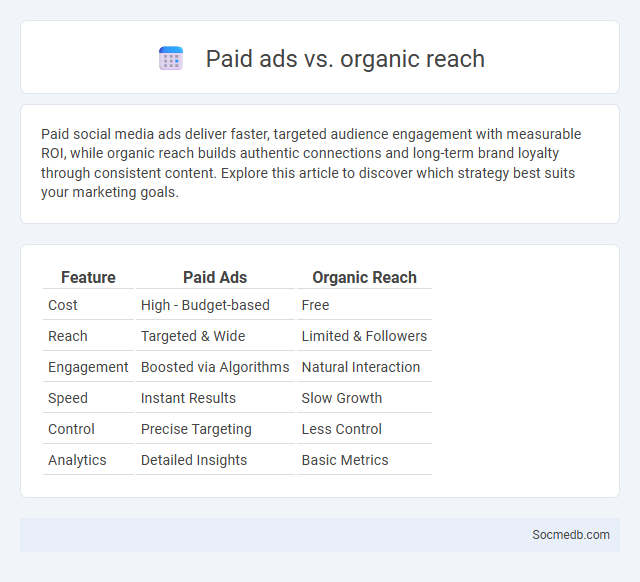
Photo illustration: Paid ads vs Organic reach
Paid social media ads deliver faster, targeted audience engagement with measurable ROI, while organic reach builds authentic connections and long-term brand loyalty through consistent content. Explore this article to discover which strategy best suits your marketing goals.
Table of Comparison
| Feature | Paid Ads | Organic Reach |
|---|---|---|
| Cost | High - Budget-based | Free |
| Reach | Targeted & Wide | Limited & Followers |
| Engagement | Boosted via Algorithms | Natural Interaction |
| Speed | Instant Results | Slow Growth |
| Control | Precise Targeting | Less Control |
| Analytics | Detailed Insights | Basic Metrics |
Understanding Paid Ads, Organic Reach, and Virality
Understanding paid ads, organic reach, and virality is essential for mastering social media marketing. Paid ads allow you to target specific demographics and boost visibility quickly, while organic reach depends on content quality and user engagement without direct costs. Virality occurs when content is widely shared, often due to emotional resonance or trends, exponentially increasing exposure and potential impact on your brand.
Key Differences Between Paid and Organic Strategies
Paid social media strategies utilize targeted advertising to reach specific audiences quickly, generating immediate traffic and measurable ROI. Organic strategies rely on creating engaging content and fostering authentic interactions to build brand loyalty and long-term community growth. Your choice between paid and organic approaches depends on your marketing goals, budget, and desired timeline for results.
Advantages of Investing in Paid Advertising
Investing in paid advertising on social media platforms delivers precise audience targeting and measurable ROI, enabling Your campaigns to reach potential customers efficiently. These ads boost brand visibility, increase website traffic, and drive higher conversion rates through tailored content and strategic placements. The ability to analyze ad performance data allows continuous optimization to maximize Your marketing budget's effectiveness.
The Power and Limitations of Organic Reach
Organic reach on social media allows your content to connect with an authentic audience without paid promotion, fostering genuine engagement and brand loyalty. Platforms' algorithms prioritize content relevance and user interaction, yet they limit organic reach to encourage paid advertising, making it challenging for posts to go viral without strategic optimization. Understanding these dynamics helps you maximize visibility while balancing expectations for growth and investment.
How Virality Impacts Online Presence
Virality significantly amplifies online presence by rapidly increasing content reach and engagement across social media platforms like TikTok, Instagram, and Twitter. Viral content often generates exponential growth in followers, shares, and comments, enhancing brand awareness and authority. This surge in visibility can boost SEO rankings and attract collaborations, driving sustained digital influence.
Cost Analysis: Paid Ads vs Organic Reach
Paid ads on social media deliver immediate visibility and targeted audience engagement but require continuous budget allocation and careful cost-per-click (CPC) monitoring to ensure ROI. Organic reach depends on high-quality content, consistent posting, and algorithmic factors, offering cost-effective long-term engagement yet limited control over audience targeting and slower growth. You should analyze your campaign goals and budget to balance paid advertising costs against the sustainable benefits of organic reach for optimal social media marketing performance.
Measuring ROI: Which Strategy Delivers More Value?
Measuring ROI in social media marketing requires analyzing key performance indicators such as engagement rates, conversion rates, and customer acquisition costs to determine which strategy delivers higher value. Paid advertising campaigns often provide measurable immediate results, while organic content strategies build long-term brand loyalty and sustained audience growth. Businesses leveraging data analytics tools can optimize budget allocation by comparing the effectiveness of influencer partnerships versus targeted ad spends to maximize return on investment.
When to Choose Paid Ads, Organic Reach, or Seek Virality
Choose paid ads on social media when targeting specific demographics and ensuring immediate visibility through precise audience segmentation and budget control. Rely on organic reach to build authentic engagement by consistently sharing valuable content that aligns with the platform's algorithm and audience interests. Seek virality by crafting highly shareable, emotionally resonant content designed to trigger rapid user interaction and widespread dissemination across networks.
Integrating Paid, Organic, and Viral Approaches
Integrating paid, organic, and viral strategies on social media maximizes reach and engagement by leveraging targeted advertisements, authentic content, and shareable campaigns. Paid social ads enhance visibility among specific demographics while organic posts build trust and foster community interaction. Viral content amplifies brand awareness rapidly through user-driven sharing, creating exponential growth when combined with paid and organic efforts.
Future Trends: Paid, Organic, and Viral Marketing
Future social media strategies will increasingly integrate paid, organic, and viral marketing techniques to maximize engagement and ROI. Advances in AI-driven analytics enable precise targeting for paid ads while enhancing content creation to boost organic reach and encourage viral sharing. Brands leveraging a balanced mix of these methods are poised to achieve sustained growth and deeper audience connections in the evolving digital landscape.
 socmedb.com
socmedb.com